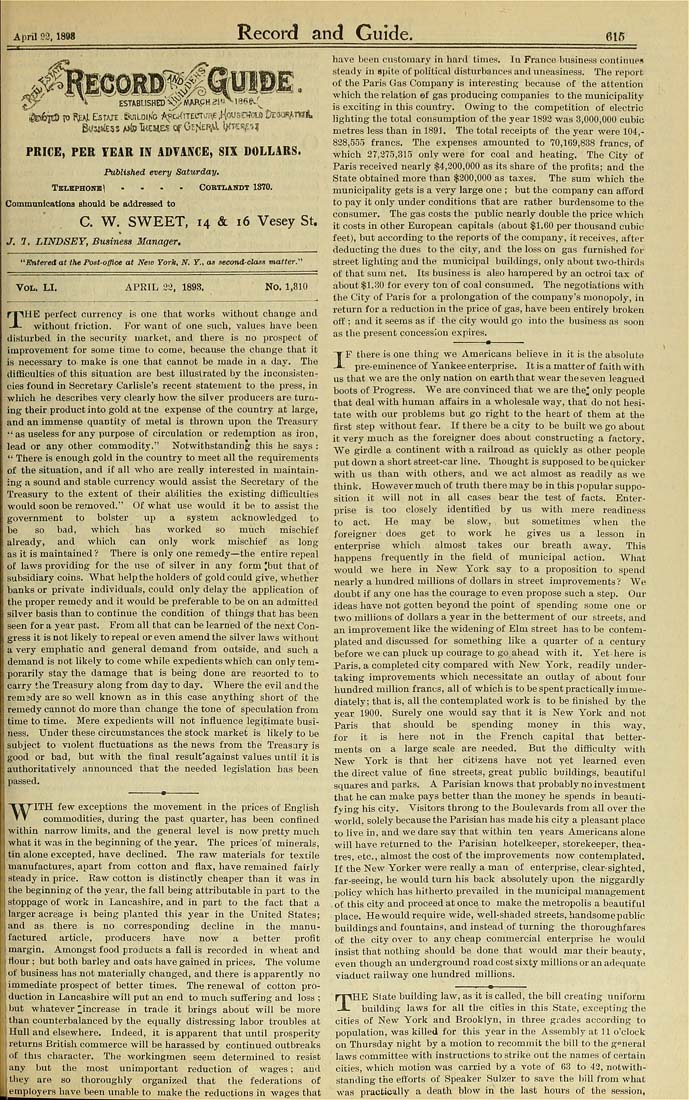Columbia University Libraries Digital Collections: The Real Estate Record
Use your browser's Print function to print these pages.
Real estate record and builders' guide: v. 51, no. 1310: April 22, 1893

Text version:
nliiines steady in spite of political disturbances and uneasiness. The report of tbe Paris Gas Company is interesting hecause of the attention which the relation of gas producing companies to the municipality is exciting in this couutry. Owing to the competition of electric lighting tbe total consumption of the year 1893 waa 3,000,000 cubic metres less than in 1891. The total receipts of the year were 104,- 838,555 francs. The expenses amounted to 70,169,838 francs, of which 27,375,315 only were for coal and heating. The City of Paris received nearly $4,300,000 as its share of tbe profits; and the State obtained more than $200,000 as taxes. The sura whicb tbe municipality gets is a very large one ; but the company can afford to pay it only under conditions that are rather burdensome to tbe consumer. The gas costs the public nearly double the price which it costs in other European capitals (about $1.60 per thousand cubits feet), but according to tbe reports of the company, it receives, after deducting the dues to the city, and the loss on gas furnished for street lighting and tbe municipal buildings, only about two-thirds of that sum net. Its businesa is also hampered hy an octroi tax of about$l,;W for every ton of coal consumed. The negotiations with the Oity of Paris for a prolongation of the company's monopoly, in return for a reduction in the price of gas, have been entirely broken off ; and it seems as if the city would go iuto the business as soon as the present poncession expires. ----------m---------- IF there is one thing we Americans believe in it is the absolute pre-eminence of Yankee enterprise. It is a matter of faith with ua that we are the only nation on earth that wear theseven leagnetl boots of Progress. We are convinced that we are the^ only people that deal with human affairs in a wholesale way, that do not hesi¬ tate with our problems but go right to tbe heart of them at the first step without fear. If there be a city to be built we go about it very much as the foreigner does about constructing a factory. We girdle a continent with a railroad as quickly as other people put down a short street-car line. Thought is supposed to be quicker with us than with others, and we act almost as readily as we think. Howevermuch of truth there may be in this popular suppo¬ sition it will not in all cases bear the teat of facts. Enter¬ prise is too closely identified by us with mere reatltneas to act. He may be slow, but sometimes ' when the foreigner does get to work he gives us a lesson in enterprise which almost takes our breath away. Tbia happens frequently in tbe field of municipal action. What would we here in New York say to a propositioa to spend nearly a hundred millions of dollars in street improvements? We doubt if any one has the courage to even propose such a step. Our ideas have not gotten beyond the point of spending some one or two millions of dollars a year in tbe betterment of our streets, and an improvement like the widening of Elm street has to be contem¬ plated and discussed for something like a quarter of a century before we can pluck up courage to go ahead witb it. Yet here is Paris, a completed city compared with New York, readily uuder- taking improvements which necessitate an outlay of about four hundred million francs, all of which is to be spent practically imme¬ diately; that is, all the contemplated work is to be finished by the year 1900. Surely one would say that it is New York and not Paris that should be spending money in this way, for it is here not in the French capital that better¬ ments on a large scale are needed. But the difiiculty with New York is that her citizens have not yet learned even the direct value of fine streets, great public buildings, beautiful squares and parks. A Parisian knows that probably no investment tbat he can make pays better than the money he spends in beauti- f ving his city. Visitors throng to the Boulevards from all over tbe world, solely because the Parisian has made his city a pleasant place to live in, and we dare say tbat within ten vears Americans alone will have returned to tbe Parisian hotelkeeper, storekeeper, thea¬ tres, etc., almost the cost of the improvements now contemplated. If the New Yorker were really a man of enterprise, clear-sighted, far-seeing, he would turn his back absolutely upon the niggardly policy which lias hitherto prevailed in the municipal management of tbis city and proceed at once to make the metropolis a beautiful place. He would require wide, well-shaded streets, handsomepublic buildings and fountains, and instead of turning the thoroughfares of the city over to any cheap commercial enterprise he would insist that notbiug should be done that would mar their beauty, even though an uuderground road cost sixty millions or an adequate viaduct railway one hundred millions. THE State building law, as it is called, the bill creating uniform building lawa for all tbe cities in this State, excepting the cities of New York and Brooklyn, in three grades according to population, was killed for this year in the Assembly at 11 o'clock on Thursday night by a motion to recommit the bill to the general laws committee with instructions to strike out the names of certain cities, which motion was carried by a vote of (13 to 43, notwith¬ standing the eft'orts of Speaker Sulzer to save the bill from what was practically a death blow in the last hours of the session,